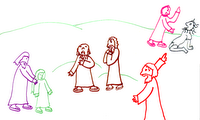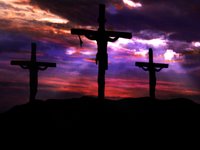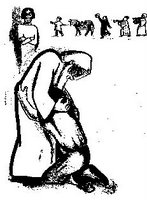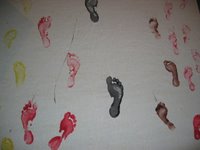Footprints of Children
 16th Sunday after Pentecost B
16th Sunday after Pentecost BMark 9:30-37
Jesus and his disciples are walking along towards Capernaum, headed toward Jerusalem. They are walking, all of them together -- several people walking along on a road, chatting about things in different little groups. You can imagine how it was, the disciples discussing which one was best.
John, "Jesus likes me the best."
Peter, "But I'm clearly the leader."
Matthew, "I gave up a lucrative career for this. I'm the greatest."
Judas, "You are are men of narrow vision. I'm the one headed to glory."
When they arrive at the house where Jesus is staying in Capernaum, a family's house with children running around, as they settle in to their evening meal, Jesus casually asks them, "What were you discussing as we walked along?"
There is an awkward silence. Then, "Uh, nuthin." "We weren't talking about anything at all, really." "Just chatting, you know."
Jesus picked up one of the children running through the room. "If you want to be great, be like this child. If you welcome this child, you
 welcome me."
welcome me."Of course they didn't get it. Just another chapter along two of them, James and John, will ask, "Can we sit at your right and left hand, Jesus?"
They wanted to be with Jesus. They wanted to sit at his right and left hand, to sit at his feet, to be in his presence. They wanted to be part of what was going on with him. They wanted a piece of the action. But they had no idea what the action was.
You see, the places at the right and left hand of Jesus were already taken. They were taken by the two criminals who were executed on either side of him.
The place at his feet was taken - by the outcast woman who anointed his feet before his death, and by the woman who touched his robe when he wasn’t looking so she would be healed, by the poor and sick who came to him asking to be healed.
The place in Jesus presence was taken by children -- powerless, property of their parents, unable to protect themselves.
We also want to be with Jesus. We want to be near him, to be in the inner circle, to be close, to walk in his presence. Yet those places are taken. What do we do?

The places on Jesus right and left are taken by two criminals being executed. But we can care for the criminals. One woman in the congregation is regularly writing to a young man imprisoned for a violent deed, listening to him, praying for him, offering him the care of Jesus.
This may seem impossibly hard - but we could pray for Alfonso Rodriguez, Jr. who was sentenced to death in North Dakota this last week.
The places at Jesus' feet are taken by the poor, the sick, the outcast. But we can care for the poor, those
 with no voice, those who are sick.
with no voice, those who are sick.One man in our congregation is developing a project to link businesses with the unemployed clients of CHUM to mentor them into being good workers.
One woman supports the Program for Victims of Sexual Assault.
One woman volunteers at the Foodshelf.
Some women knit chemo caps and take them to the area hospitals.
Many of you work with the sick to bring them comfort and healing.
The place surrounding Jesus was taken by the children, the ones of whom he said, "Welcome them and you welcome me and the one who sent me."
We can welcome the children.
This church building w
 elcomes about 80 children every weekday, for about 60 hours a week. The University Nursery School has been here for over thirty years, but it is important how we feel about them, how we treat them, how we work with them. We want to welcome families and they walk through our door everyday. So sometimes we have to negotiate the use of our classrooms, sometimes they leave a dirty spoon in our sinks, and certainly the children track sand in here and there, and sometimes we leave a mess for them - but we are providing a welcome to children here, and the community knows it. The community may not be sure where Hope United Methodist is, but they know we host the University Nursery School.
elcomes about 80 children every weekday, for about 60 hours a week. The University Nursery School has been here for over thirty years, but it is important how we feel about them, how we treat them, how we work with them. We want to welcome families and they walk through our door everyday. So sometimes we have to negotiate the use of our classrooms, sometimes they leave a dirty spoon in our sinks, and certainly the children track sand in here and there, and sometimes we leave a mess for them - but we are providing a welcome to children here, and the community knows it. The community may not be sure where Hope United Methodist is, but they know we host the University Nursery School.And we welcome the children in our worship, in our programs, in our lives. When we welcome them, we are welcomin
 g Jesus.
g Jesus.Want to be with Jesus? Follow the footprints of the condemned, the lost, the sick; follow the footprints of the children. There you will find him.

